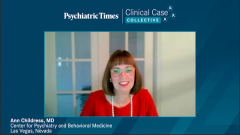
Patient Case: Impact of ADHD on Quality of Life
Panelists discuss how a patient named Kerstin was diagnosed with attention-deficity/hyperactivity disorder (ADHD) later in life during college when she struggled with organization and scheduling beyond her known dyslexia, leading to successful treatment with various stimulant medications including participation in clinical trials.
Episodes in this series

Kerstin Hazelbakershares her journey of late ADHD diagnosis, initially managing dyslexia with parental support and rigid scheduling throughout high school. Living independently at college revealed underlying ADHD symptoms, including severe organizational challenges, memory issues with assignments, and difficulty maintaining schedules without external structure. Her symptoms significantly impacted her quality of life, and she required excessive time for basic tasks such as meal preparation and studying. This led to chronic sleep deprivation and academic struggles that prompted her to seek professional evaluation and diagnosis.
Following her ADHD diagnosis during graduate school, Kerstin experienced a transformative medication journey from initial atomoxetine failure to successful stimulant treatment. She participated in clinical trials with extended-release methylphenidate formulations, eventually settling on Vyvanse after trying Concerta. The medication switch dramatically improved her academic performance and daily functioning, though she faced significant challenges during medication shortages that required pharmacy shopping and brand switching. Her experience highlights the importance of persistence in finding optimal ADHD treatment.
As a dental sales representative, Kerstin discovered how ADHD symptoms can both challenge and benefit professional performance. Although her ADHD traits such as chattiness and energy suited sales interactions perfectly, executive function difficulties made administrative tasks such as call logging and paperwork extremely challenging. Proper ADHD medication management transformed her work performance, enabling automatic completion of previously overwhelming tasks and improving her organizational skills. Her story demonstrates that with appropriate treatment, individuals with ADHD can excel in careers that leverage their natural strengths while managing their challenges effectively.
Newsletter
Receive trusted psychiatric news, expert analysis, and clinical insights — subscribe today to support your practice and your patients.








